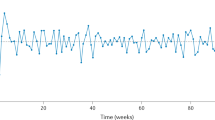Abstract
As more and more economic activity moves to the Internet, familiar economic mechanisms are being deployed at unprecedented scales of size, speed, and complexity. In many cases this new complexity becomes the defining feature of the deployed economic mechanism and the quantitative difference becomes a key qualitative one. We suggest to study this complexity and understand in which cases and to what extent it is necessary.
Access this chapter
Tax calculation will be finalised at checkout
Purchases are for personal use only
Similar content being viewed by others
Notes
- 1.
An existing research field often termed “Complexity Economics” applies notions and ways of thinking from “Complexity Science” (e.g. James Gleick 1997) to economic systems. The suggestion here however is to proceed in a different direction, one whose view of “complexity” is taken from theoretical computer science rather than from physics.
References
Blumrosen, L., & Nisan, N. (2007). Combinatorial auctions (a survey). In N. Nisan, T. Roughgarden, E. Tardos, & V. Vazirani (Eds.), Algorithmic game theory. Cambridge: Cambridge University Press.
Dobzinski, S., Nisan, N., & Oren, S. (2014). Economic efficiency requires interaction. In Symposium on Theory of Computing, STOC 2014, New York, NY, USA, May 31 - June 03, 2014 (pp. 233–242).
Gleick, J. (1997). Chaos: Making a new science. New York: Random House.
Hart, S., & Mas-Colell, A. (2013). Simple adaptive strategies: from regret-matching to uncoupled dynamics (Vol. 4). Singapore: World Scientific.
Hart, S., Nisan, N. (2013). The menu-size complexity of auctions. In Proceedings of the Fourteenth ACM Conference on Electronic Commerce (EC) (pp. 565).
Nisan, N. (2006). Combinatorial auctions. Bidding languages. Cambridge: MIT Press.
Nisan. N. (2014). Algorithmic mechanism design. Handbook of game theory (pp. 477).
Nisan, Noam, Roughgarden, Tim, Tardos, Eva, & Vazirani, Vijay V. (2007). Algorithmic game theory. New York: Cambridge University Press.
Papadimitriou, C. H. (2003). Computational complexity. New York: Wiley.
Roughgarden, T., Talgam-Cohen, I. (2015). Why prices need algorithms. In Proceedings of the Sixteenth ACM Conference on Economics and Computation (pp. 19–36). Providence: ACM.
Author information
Authors and Affiliations
Corresponding author
Editor information
Editors and Affiliations
Rights and permissions
Copyright information
© 2019 Springer Nature Switzerland AG
About this chapter
Cite this chapter
Nisan, N. (2019). Complexity and Simplicity in Economic Design. In: Laslier, JF., Moulin, H., Sanver, M., Zwicker, W. (eds) The Future of Economic Design. Studies in Economic Design. Springer, Cham. https://doi.org/10.1007/978-3-030-18050-8_21
Download citation
DOI: https://doi.org/10.1007/978-3-030-18050-8_21
Published:
Publisher Name: Springer, Cham
Print ISBN: 978-3-030-18049-2
Online ISBN: 978-3-030-18050-8
eBook Packages: Economics and FinanceEconomics and Finance (R0)




